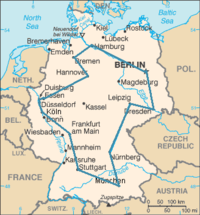- Combinatorial optimization
-
In applied mathematics and theoretical computer science, combinatorial optimization is a topic that consists of finding an optimal object from a finite set of objects.[1] In many such problems, exhaustive search is not feasible. It operates on the domain of those optimization problems, in which the set of feasible solutions is discrete or can be reduced to discrete, and in which the goal is to find the best solution. Some common problems involving combinatorial optimization are the traveling salesman problem and the minimum spanning tree problem.
Combinatorial optimization is a subset of mathematical optimization that is related to operations research, algorithm theory, and computational complexity theory. It has important applications in several fields, including artificial intelligence, machine learning, mathematics, auction theory, and software engineering.
Some research literature[2] considers discrete optimization to consist of integer programming together with combinatorial optimization (which in turn is composed of optimization problems dealing with graphs, matroids, and related structures) although all of these topics have closely intertwined research literature. It often involves determining the way to efficiently allocate resources used to find solution to mathematical problems.
Contents
Applications
Methods
There is a large amount of literature on polynomial-time algorithms for certain special classes of discrete optimization, a considerable amount of it unified by the theory of linear programming. Some examples of combinatorial optimization problems that fall into this framework are shortest paths and shortest path trees, flows and circulations, spanning trees, matching, and matroid problems.
For NP-complete discrete optimization problems, current research literature includes the following topics:
- polynomial-time exactly-solvable special cases of the problem at hand (e.g. see fixed-parameter tractable)
- algorithms that perform well on "random" instances (e.g. for TSP)
- approximation algorithms that run in polynomial time and find a solution that is "close" to optimal
- solving real-world instances that arise in practice and do not necessarily exhibit the worst-case behaviour inherent in NP-complete problems (e.g. TSP instances with tens of thousands of nodes[3]).
Combinatorial optimization problems can be viewed as searching for the best element of some set of discrete items, therefore, in principle, any sort of search algorithm or metaheuristic can be used to solve them. However, generic search algorithms are not guaranteed to find an optimal solution, nor are they guaranteed to run quickly (in polynomial time). (Since some discrete optimization problems are NP-complete, such as the travelling salesman problem, this is expected unless P=NP.)
Specific problems
- Vehicle routing problem
- Traveling salesman problem (TSP)
- Minimum spanning tree problem
- Linear programming (if the solution space is the choice of which variables to make basic)
- Integer programming
- Eight queens puzzle (A constraint satisfaction problem. When applying standard combinatorial optimization algorithms to this problem, one would usually treat the goal function as the number of unsatisfied constraints (say number of attacks) rather than as a single boolean indicating whether the whole problem is satisfied or not.)
- Knapsack problem
- Cutting stock problem
- Weapon target assignment problem
Further reading
- Schrijver, Alexander. Combinatorial Optimization: Polyhedra and Efficiency. Algorithms and Combinatorics. 24. Springer.
External links
- Alexander Schrijver. On the history of combinatorial optimization (till 1960).
- Lecture notes
- Integer programming notes, J E Beasley.
- Source code
- Java Combinatorial Optimization Platform open source project.
- Others
- Alexander Schrijver; A Course in Combinatorial Optimization February 1, 2006 (© A. Schrijver)
- William J. Cook, William H. Cunningham, William R. Pulleyblank, Alexander Schrijver; Combinatorial Optimization; John Wiley & Sons; 1 edition (November 12, 1997); ISBN 0-471-55894-X.
- Eugene Lawler (2001). Combinatorial Optimization: Networks and Matroids. Dover. ISBN 0486414531.
- Jon Lee; A First Course in Combinatorial Optimization; Cambridge University Press; 2004; ISBN 0-521-01012-8.
- Pierluigi Crescenzi, Viggo Kann, Magnús Halldórsson, Marek Karpinski, Gerhard Woeginger, A Compendium of NP Optimization Problems.
- Christos H. Papadimitriou and Kenneth Steiglitz Combinatorial Optimization : Algorithms and Complexity; Dover Pubns; (paperback, Unabridged edition, July 1998) ISBN 0-486-40258-4.
- Arnab Das and Bikas K Chakrabarti (Eds.) Quantum Annealing and Related Optimization Methods, Lecture Note in Physics, Vol. 679, Springer, Heidelberg (2005)
- Journal of Combinatorial Optimization
- Arnab Das and Bikas K Chakrabarti, Rev. Mod. Phys. 80 1061 (2008)
References
- ^ Schrijver, p. 1
- ^ "Discrete Optimization". Elsevier. http://www.elsevier.com/locate/disopt. Retrieved 2009-06-08.
- ^ Bill Cook. "Optimal TSP Tours". http://www.tsp.gatech.edu/optimal/index.html. Retrieved 2009-06-08.
- ^ Take one city, and take all possible orders of the other 14 cities. Then divide by two because it does not matter in which direction in time they come after each other: 14!/2 = 43,589,145,600.
Optimization: Algorithms, methods, and heuristics Unconstrained nonlinear: Methods calling ... ... and gradients... and HessiansConstrained nonlinear GeneralDifferentiableAugmented Lagrangian methods · Sequential quadratic programming · Successive linear programmingConvex minimization GeneralBasis-exchangeCombinatorial ParadigmsApproximation algorithm · Dynamic programming · Greedy algorithm · Integer programming (Branch & bound or cut)Graph algorithmsMetaheuristics
Wikimedia Foundation. 2010.


